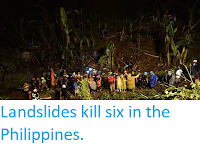The Philippine Institute of Volcanology and Seismology
recorded a Magnitude 6.6 Earthquake at a depth of 7 km about 22 km to
the east of the town of Tulunan in Cotabato Province on Mindanao
Island, Philippines, slightly after 9.00 am local time (slightly after 1.00 am GMT) on Tuesday 29 October 2019. The Earthquake is known to
have killed at least seven people and injured at least 215 more,
including a fifteen-year-old high school student killed by a collapsing wall in Davao del Sur Province, a 66-year-old man who died of head injuries in South Cotabato, and a father and child killed in Cotabato. The Earthquake is also reported to have destroyed about 1200 buildings, including ten schools. A number of aftershocks have been recorded since the original event, several of them with Magnitudes in excess of 5.0.
Damage to a building in the town of Magsaysay in Davao del Sur Province, the Philippines, following an Earthquake on 29 October 2019. Anthony Allada/Facebook/AFP.
The geology of the central Philippines is Complex. The west of Mindanao
Island is located on the Banda (or Sunda) Microplate, and the east on
the Philippine Plate, which is being subducted beneath the Sunda (or
Banda) Microplate along the central part of the island. Immediately to
the east of the Island the Pacific Plate is being subducted along the
Philippine Trench, and passes beneath eastern Mindanao as it sinks into
the Earth. This is not a smooth process, an the plates constantly stick
together then break apart again as the pressure builds up, resulting in
Earthquakes.
Subduction beneath the Philippines. Yves Descatoire/Singapore Earth Observatory.
Witness
accounts of Earthquakes can help geologists to understand these events,
and the structures that cause them. The international non-profit
organisation Earthquake Report is interested in hearing from people who may have felt this event; if you felt this quake then you can report it to Earthquake Report here.
The
location of the 29 October 2019 Cotabato Province Earthquake. Contour
lines show rates of movement during the quake, the red line is a
boundary between two tectonic plates, in this case the Pacific and Philippine plates. USGS.
See also...









